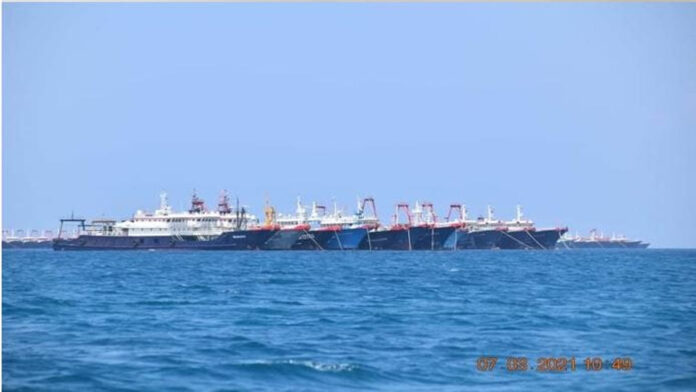The Philippines and China are making progress in their discussions about fishing rights in the West Philippine Sea (WPS), President Ferdinand R. Marcos Jr. said on Tuesday.
“These things do not come very quickly… But we are slowly making progress because the key to that is the improved communication between the Philippine government and the Chinese government,” Marcos said on the sidelines of the Department of Agriculture’s 125th founding anniversary celebration in Diliman, Quezon City.
“That is because we are continuing to talk to the Chinese government, to [Chinese] President Xi [Jinping] in every way,” he added.
Marcos issued the statement when asked for an update on the two countries’ discussion amid Filipino fisherfolk’s concern over the continued presence of the Chinese Coast Guard in the WPS.
Recently, GMA Integrated News reported that a Chinese gray (military) ship tailed BRP Francisco Dagohoy, a multi-mission vessel of the Bureau of Fisheries and Aquatic Resources (BFAR).
It happened about six nautical miles southwest of Pag-asa Island, which is within the 200-nautical mile of the Philippines exclusive economic zone.
Marcos recalled that during his bilateral meeting with Xi in China in January this year, he raised the issues about fishing rights in the WPS.
He also cited the BFAR projection that local fisherfolk would get more catch because of the improved situation in the fishing grounds in WPS.
He ensured the government is ready to provide livelihood assistance in case China imposes anew a seasonal fishing ban.
“Kapag may fishing ban, may coordination na tayong ginagawa sa kanila, para hindi na lang bigla fishing ban na ngayon. Makapagplano naman (If there is a fishing ban, there is a coordination with them so we will not be surprised. We could make a plan),” Marcos said.
“Kapag sasabihin may fishing ban in two months’ time, planuhin na natin. Ano gagawin ng mangingisda, so bigyan natin sila ibang (If they say there will be fishing ban in two months, let’s have a plan for our fishermen and provide them a) livelihood or other source of income,” he added.
At the opening session of the 7th Bilateral Consultations Mechanism on the South China Sea in Manila on March 24, Foreign Affairs Undersecretary Ma. Theresa Lazaro emphasized existing diplomatic channels, including a communication line between the two states’ foreign ministries.
Lazaro noted that Marcos and Xi “agreed that maritime issues should be addressed through diplomacy and dialogue and never through coercion and intimidation.”
Illegal, unreported, unregulated fishing
Meantime, Marcos ordered the DA and BFAR to come up with comprehensive study on the rehabilitation and maintenance of marine habitats to address illegal, unreported and unregulated fishing (IUUF), Communications Secretary Cheloy Garafil said in a statement.
Garafil said the DA and BFAR, in a June 13 meeting with Marcos, were directed to work closely with the Office of the Executive Secretary to craft the necessary issuances to implement Fisheries Administrative Order (FAO) 266, signed in 2020 to require commercial fishing vessels (CFVs) to install vessel monitoring systems.
She said Marcos ordered the two agencies to study the establishment of Strategic Agriculture and Fisheries Development Zones to provide fishery stakeholders with an area for sustainable fishing and to review the licenses of CFVs that fail to comply with FAO 266.
Garafil said the DA and BFAR were likewise directed to study Republic Act 8550 or the Philippine Fisheries Code of 1998, as amended by RA 10654, to determine the provisions that need to be amended.
“President Marcos, who is also the concurrent DA Secretary, has emphasized in a meeting on June 13 the need for the Philippines to comply with its international commitments, particularly to the European Union on preventing IUUF,” she said.
“He also highlighted the importance of addressing the concerns of fishery stakeholders by using a science-based approach in managing marine resources,” Garafil added. (PNA)
Photo credit: Facebook/pcogovph


